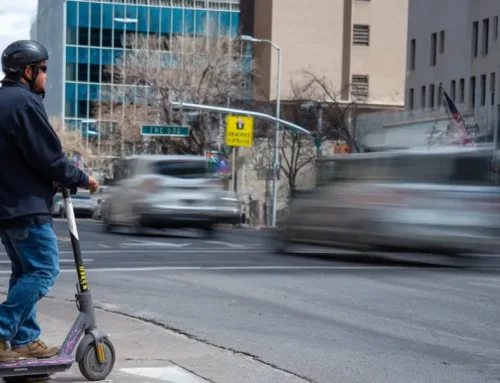What Law Governs Uber and Lyft in New Mexico?
New Mexico’s Transportation Network Company Services Act (NMSA 1978, § 65-7-1 et seq.) is the primary law regulating Uber, Lyft, and similar rideshare services in the state. This law, enacted in 2016, formally legalized ridesharing and set out rules to ensure safety and accountability. Under the Act, companies like Uber and Lyft are classified as “Transportation Network Companies” (TNCs), a new category distinct from traditional taxis or motor carriers. In other words, rideshare companies aren’t regulated as taxi services; instead, they operate under their own set of requirements overseen by the New Mexico Public Regulation Commission. For example, each TNC must obtain a state permit (with an annual fee of $10,000) and perform driver background checks.
Uber and Lyft are treated equally under New Mexico law – both are simply TNCs and have to follow the same rules. The law doesn’t single out one company over the other. Notably, an earlier draft of the legislation would have explicitly labeled rideshare drivers as independent contractors, but the final law was silent on that point. In practice, however, Uber and Lyft drivers are not employees of those companies, meaning the companies generally are not directly liable for drivers’ accidents beyond the insurance coverage they provide. Instead, New Mexico’s rideshare law focuses on consumer protection measures like insurance coverage, driver qualifications, and service standards to protect the public without treating TNCs exactly like taxi companies.

Does New Mexico’s Rideshare Law Protect Passengers and the Public?
The cornerstone of New Mexico’s rideshare law is a set of strict insurance requirements designed to protect anyone injured in an Uber or Lyft accident. The law mandates that both the rideshare company and/or its driver maintain specific minimum insurance coverage at all times while using the app. This ensures that if an accident happens, there is an insurance policy available to compensate injured passengers or third parties. Key protections include:
-
High Liability Coverage: Whenever a rideshare driver has accepted a ride or is carrying a passenger, there must be at least $1,000,000 in primary liability insurance in effect. This $1 million policy covers death, bodily injury, and property damage per incident while a ride is in progress (from the moment a driver accepts a trip request until the passenger is dropped off). The $1 million coverage far exceeds New Mexico’s normal minimum auto insurance limits and is designed to cover serious accidents. It applies regardless of whether the policy is maintained by the driver or by the company. In practice, companies like Uber and Lyft satisfy this requirement through their corporate insurance policies.
-
Coverage During App “On” Periods: When a driver is logged into the Uber/Lyft app but has not yet accepted a ride, New Mexico law still requires substantial coverage (often called the “period 1” coverage). In this waiting-for-a-request phase, the driver or TNC must have at least $50,000 in liability coverage per person, $100,000 per accident for bodily injury, and $25,000 for property damage. This coverage can come from a policy maintained by the driver or the company. In practice, Uber and Lyft provide a contingent liability policy during this period that meets these limits It acts as primary insurance if the driver’s personal auto insurer denies a claim. (Notably, New Mexico’s statute explicitly allows personal auto insurers to exclude coverage while a vehicle is being used for rideshare, which is why the TNC’s contingent policy is critical.) This ensures that even before a passenger is in the car, there’s some insurance in place to protect other drivers, pedestrians, or property in case of an at-fault crash.
-
Standard Coverage Off the App: If the driver is not logged into the rideshare app (i.e. “offline”), the situation is treated like any normal driving scenario. The rideshare company has no responsibility at that moment, so only the driver’s personal auto insurance applies (per standard state law requirements). New Mexico’s minimum liability limits for private autos are $25,000 per person / $50,000 per accident for injury, and $10,000 for property damage. However, most personal auto policies contain a rideshare exclusion, meaning if the driver was working at the time of the crash, the personal insurer can deny coverage. That’s why determining app status is so important: if the driver truly was “offline” (not available for rides), any accident is just like a regular car accident; but if they were online and driving for Uber/Lyft, then the special rideshare insurance should apply instead.
-
Uninsured/Underinsured Motorist Coverage: New Mexico also requires that rideshare insurance include uninsured/underinsured motorist (UM/UIM) coverage in the same scenarios described above (at least to the extent required by state law). UM/UIM coverage protects you if an accident is caused by a hit-and-run driver or another driver who has no insurance (or not enough insurance). For example, if you’re a passenger in an Uber and another car crashes into you but that at-fault car’s driver has no insurance, Uber’s $1 million UM coverage can step in to cover your injuries. New Mexico law generally requires insurers to offer UM coverage equal to liability limits unless it’s rejected in writing, so rideshare companies typically carry substantial UM coverage for rideshare periods. This is an extra layer of protection for passengers and others injured, ensuring that even if the other driver is uninsured or underinsured, there is coverage available through the rideshare’s policy.
-
Prompt Electronic Records: After every trip, the TNC must send the rider an electronic receipt showing the trip’s origin, destination, distance, time, and fare. While this may seem like a simple convenience, it also means there’s an official record of your ride details. In the event of an accident, this receipt can help establish that you were a passenger on a prearranged ride at that time, which is useful when dealing with insurance claims or any legal action. It’s one of the law’s consumer-friendly provisions that improves transparency.
Overall, New Mexico’s rideshare law is designed to make sure that injured passengers or third parties are not left in the cold after an Uber/Lyft accident. By requiring $1 million in coverage during rides and significant coverage even when drivers are just waiting for a fare, the law provides a safety net far stronger than ordinary minimum insurance. This framework gives anyone hurt in a rideshare-related crash a clear path to recover damages (typically through an insurance claim) without having to immediately resort to suing drivers or complicated legal battles.

But what if insurance won’t pay, or Uber fights your claim, or they lowball your injuries when you’ve been hurt by a rideshare driver? While New Mexico’s rideshare law creates strong insurance protections on paper, the reality of dealing with billion-dollar companies and their insurance carriers can be far more complicated. When you’re facing serious injuries, mounting medical bills, and lost income, you need to know your rights and options beyond just filing an insurance claim.
When Rideshare Insurance Companies Deny or Delay Your Claim
Even with New Mexico’s mandatory coverage requirements, insurance companies don’t automatically write checks just because an accident happened. Rideshare insurers often use sophisticated tactics to minimize payouts or deny claims entirely. They might argue that the driver wasn’t actually “on duty” at the time of your accident, claiming the app wasn’t active or that the crash occurred outside the covered period. They may dispute the severity of your injuries, argue that you had pre-existing conditions, or claim that another driver was actually at fault for the collision.
These delay tactics aren’t accidental. Insurance companies know that injured victims face immediate financial pressure from medical bills and lost wages. By dragging out the claims process, they hope you’ll accept a lowball settlement rather than fight for full compensation. They may also use recorded statements against you, taking advantage of your pain medication or emotional distress in the aftermath of the crash to get you to say something that undermines your claim.
The App Status Battle
One of the most common disputes in rideshare accident cases involves determining exactly what the driver was doing at the time of the crash. Was the app on or off? Had they accepted a ride request? Were they carrying a passenger? These questions directly impact which insurance policy applies and how much coverage is available. Uber and Lyft have detailed data about driver activity, but they don’t always volunteer this information readily. It often takes legal power to force them to reveal the truth. That’s exactly what a personal injury lawyer is for.
If there’s any ambiguity about the driver’s status, insurance companies will interpret it in the way most favorable to them. For example, if a driver claims they had just logged off the app seconds before an accident, the rideshare company might argue that only the driver’s personal insurance applies, even though that policy likely excludes rideshare activity. This can leave you caught between two insurance companies, each claiming the other should pay.
Fighting for Fair Compensation
New Mexico law gives you the right to pursue full compensation for all your damages, not just what an insurance company initially offers. This includes not only your medical expenses and lost wages, but also compensation for pain and suffering, permanent disability, future medical needs, and the impact on your quality of life. Insurance companies typically offer settlements based on their internal formulas that significantly undervalue these non-economic damages.
You also have the right to hold multiple parties accountable. While the rideshare driver is obviously responsible for causing your injuries, you may also have claims against other negligent drivers involved in the accident, vehicle manufacturers if a defect contributed to the crash, or even government entities if dangerous road conditions played a role. In some cases, you might even have grounds to pursue claims against Uber or Lyft directly, particularly if they failed to properly screen a driver with a dangerous driving history. This kind of thing happens all the time, and without an experienced lawyer on your side, you may never know that the driver Uber hired was actually fired from a taxi company for having too many wrecks.

Your Legal Options Beyond Insurance
If insurance negotiations fail or the available coverage is insufficient for your injuries, you can file a personal injury lawsuit to recover additional compensation. New Mexico allows you to seek punitive damages in cases involving particularly reckless or intentional conduct, which can significantly increase your recovery beyond just compensatory damages. The state also doesn’t cap non-economic damages in most personal injury cases, meaning there’s no artificial limit on what you can recover for pain and suffering from severe injuries.
Time limits do apply, however. New Mexico’s statute of limitations gives you three years from the date of the accident to file a lawsuit, though it’s always better to act sooner while evidence is fresh and witnesses’ memories are clear. Waiting too long can also make it harder to prove the full extent of your injuries and their long-term impact on your life.
Protecting Your Rights from Day One
The steps you take immediately after a rideshare accident can significantly impact your ability to recover full compensation later. Always seek immediate medical attention, even if you don’t think you’re seriously hurt, as some injuries don’t show symptoms right away. Document everything you can about the accident scene, including photos of vehicle damage, your injuries, and the exact location. Get contact information from witnesses and make sure the police report accurately reflects what happened.
Most importantly, be extremely careful about what you say to insurance adjusters and never sign anything without legal advice. Remember that these companies have teams of lawyers and investigators working to minimize what they pay you. You deserve the same level of professional representation to protect your interests and fight for the full compensation you’re entitled to under New Mexico law.



